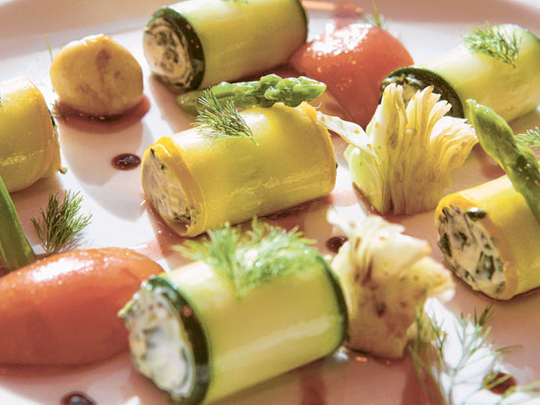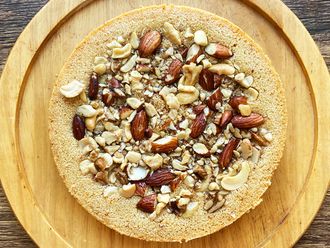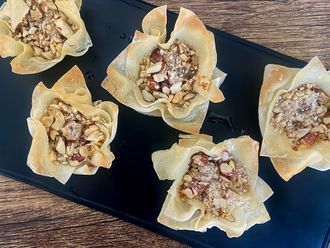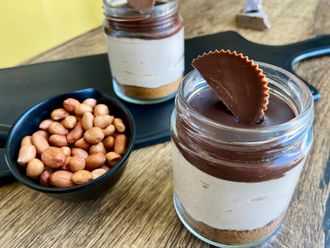
The ancient science of Ayurveda divides the human body into three categories — Vata, Pitta and Kapha — and each is governed by an element of nature or a combination of them, giving us an individual body metabolism.
"According to Ayurveda, our bodies have a dosha based on its constitution and our lifestyle and other factors affect it," says Dr Chandy George, Ayurvedic lifestyle consultant at Balance Wellness Club in Dubai. "Nature and the human body are governed by the five elements — earth, water, air, space and fire. The combinations of these elemental energies define the three major body types — Vata (space and air), Pitta (fire) and Kapha (earth and water). These categories are called the tri doshas, which are often imbalanced on account of external factors, both physical and mental, leading to illness. However, these can be rectified through awareness about what one's dosha is and with lifestyle changes".
Seasonal changes are one of the major causes of this imbalance, says Dr Shyllaja Ravikumar Pillai, manager at Soft Touch Spa in Kempinski Mall of the Emirates.
"Vata and Pitta doshas are increased due to dehydration. As the moisture in the body lessens, the natural oils are also absorbed from the body. So, one needs follow a diet to balance the three doshas."
"Signs of heat exposure are evident in everyone, but more so in those whose dominant dosha is Pitta," George adds. "Hence we are advised to consume foods and fluids which have a cooling effect on the body.
"It is essential to rehydrate by consuming up to three litres of water daily. Intake of spicy, deep fried, salty foods and fruits such as strawberry (because of its high acid content and viscous nature) should be minimised, if not totally avoided. Spices such as cardamom and coriander, and herbs such as mint and fennel can be included more in daily meals. Medium sweet and bitter foods are ideal for this season. Coffee and tea should be reduced to a minimum as they aggravate the Pitta dosha. Buttermilk, milk with sugar or sweet lassi (diluted yoghurt), fresh fruit juices — preferably watermelon, cucumber, coconut water, mint, organic rose water and cumin water — are good as they help balance the this dosha."
Replenish and restore
To replenish your body according to your body type, Pillai advises everyone to follow a particular diet to keep their doshas in harmony. "Vata-dosha predominant people should stick strictly to the vata-pacifying diet. This should include seasonal vegetables such as tomato, onion, carrot, asparagus, leafy greens, beets, sweet potatoes and summer squash such as zucchini, lauki (bottle gourd), cucumber, peas and coconut. These are easily digestible when cooked with Vata-pacifying spices such as turmeric, cumin, coriander, dried ginger, black pepper and saffron.
"Pitta-predominant people should have organic milk, mint and coriander herbal teas and sweet seasonal fruits such as pears, apricots, grapes, plums, watermelon and sweet berries are good. Cold soups, such as gazpacho, and salads are also good. But avoid salads for supper when it's best to have lightly cooked foods, such as basmati rice with sautéed sprouted mung beans and green, leafy vegetables. Avoid dark meats. Replace with white meat once a week.
"For Kapha-predominant people, seasonal fruits such as melons, pomegranates, grapes and pineapples should be freshly blended and had at room temperature. Lemon juice, lassi with mint or cilantro and sugarcane juice are also excellent choices. Ripe summer fruits such as pears, plums, nectarines and peaches are rich in moisture."
George goes on to say that though it's essential for all to stay hydrated, it's doubly important for women.
"It is essential for anyone to rehydrate themselves during the harsh summer months. Women, however, are usually more susceptible to heat-related imbalances because they tend to have a more fragile constitution. While one is advised to drink up to three litres of water every day, pregnant women must refrain from consuming more than one glass at a time. It's also important for women to protect their skin from exposure to heat, especially during the peak hours (noon-2.30pm)."
Foods to avoid
Dr Shyllaja Pillai advises everyone should at least reduce intake of these:
- Dry fruits
- Fried items
- Garlic
- Honey and alcoholic beverages
- Pungent, acid and salt tastes
- Ice-cold drinks or food, especially during meals. These will douse your digestive fire and disrupt digestion.
- Carbonated drinks, because they slow down the digestion process.
KNOW YOUR DOSHA
Dr Shyllaja Pillai tells you how to know your predominant dosha:
VATA
Physical features
Thin body frame, flat chest with veins and prominent joints visible, dry skin, less hair, quick talking, don’t perspire much, quick and unsteady movements, less or interrupted sleep, like to stay warm.
Mental traits
Fast to learn and quick to forget, tendency to act on impulse, irregular daily routine, respond to stress with fear worry and anxiety, can’t relax and concentrate, variable thoughts.
PITTA
Physical features
Medium physique strong and well built, strong digestion, strong appetite, skin fair or reddish, sunburns easily, hair tends to be red, greys early, sleep is of medium duration but uninterrupted, can’t tolerate hot environment.
Mental traits
Sharp mind, good concentration powers, assertive, self confident and aggressive, enjoy challenges, like to command.
KAPHA
Physical features
Well-developed body with big frame, tendency to gain weight easily and remain heavy. The veins and tendons of kapha people are not obvious because of their thick skin and their muscle development is good. The bones are not prominent. Their complexions are fair and bright. The skin is soft, lustrous and oily. It is also cold and pale. The hair is thick, dark, soft and wavy. The eyes are dense and black or blue: the white of the eye is generally very white, large and attractive. Kapha people have regular appetites but slow digestion. Their perspiration is moderate. Sleep is sound and prolonged and has good stamina.
Mental traits
Easy going, relaxed and slow paced. Forgiving, compassionate, non-judgmental nature, stable and reliable; faithful, happy and peaceful.
***********
MANGO PANNA
- 2 medium raw mangoes
- 750ml water
- 1 tsp cumin seeds, dry-roasted and ground
- 1 tsp black salt
- 1 tbs sugar
- 1 tsp mint leaves (pudina), chopped
- 12 ice cubes, crushed
Chargrill the mangoes or place them in a saucepan with enough water to cover them. Bring to a boil and simmer for ten minutes. Drain the water and peel, stone and pulp the mango with a spoon. Place the pulp in a deep bowl. Add water, sugar, salt and cumin, and whisk thoroughly. Stir in the mint and whisk again.
Pour into a jug and add crushed ice. Serve chilled.
This a medicinal drink which can be had in case of heat stroke. Apply raw mango pulp on the body and forehead to get relief from high fever and severe headache caused due to heat stroke (not to be mistaken as a substitute for medicine).
— Recipe: Balance Café
FINGER MILLET PORRIDGE
English name: Finger millet
Botanical name: Eleusine Coracana
- 15g finger millet, powdered
- 125g broken parboiled rice
- 250ml buttermilk
- 3-4 shallots, chopped
- Ghee to sauté shallots
- 1.25-1.5l water
- Salt, to taste
Boil the rice in 1.25l of water and cook until very well done.
Add three spoonfuls of finger millet powder and stir well. Cook for five-ten minutes until it thickens. Sauté chopped shallots in ghee.
When the rice and finger-millet mixture is cool, add buttermilk and sautéed shallots. Mix well and add salt.
Properties
- It is helpful in balancing the three doshas
- It reduces fat
- It is cold in potency and is light on the stomach
— Recipe: Dr Shyllaja Pillai
GLUTEN-FREE SQUASH ‘CANNELLONI’
- 40g spinach
- 1/2 small onion, chopped
- 50ml extra virgin olive oil
- 1 big pod of garlic
- 80g ricotta cheese
- 1 tsp sage leaves
- Pinch of nutmeg
- 40g green zucchini
- 40g squash
- 30g balsamic vinegar
- 10g sugar
- 60g tomato, deseeded and cut into quarters or one-fifths
- 80g artichoke hearts
- 20g asparagus
- 50ml water
- 20g fig
- 1 tsp fresh dill
Sauté spinach and chopped onion with a dash of olive oil. Add garlic.
Allow to cool for a few minutes and add the ricotta cheese, sage leaves and a pinch of grated nutmeg.
Slice the zucchini and squash into long strips with a mandolin. Blanch for five seconds in boiling salted water, then refresh in ice-cold water immediately to prevent further cooking. Dry on a paper towel and spread each slice with the ricotta and spinach filling. Roll like cannelloni, brush lightly with olive oil, sprinkle salt on top and bake in the oven on a non-stick tray for ten minutes at medium heat.
In a pan, reduce the balsamic vinegar by half with 5g sugar. Add the tomato and reduce to one quarter. In a different pan, toss remaining garlic cloves and artichoke hearts with a dash of olive oil. Add asparagus tips that have been blanched in boiling water for ten seconds and put in ice-cold water (follow the same method as the zucchini blanching).
Reduce the water with the rest of the sugar by adding the chopped figs. When reduced to half, blitz and add to the sauce.
For the assembly
Drizzle sauce on the plate. Place the cannelloni with artichokes, garlic, asparagus and tomato and garnish with dill.
— Recipe: Balance Café
ZUCCHINI CURRY
- 250g zucchini
- 1 onion, large
- 1/2 tsp turmeric
- 1/4 tsp cumin seeds
- 1 tsp coriander powder
- 1/4 tsp ginger, dried
- Salt to taste
- Pepper to taste
- 2 tbs oil
- 125ml water (optional)
Peel the zucchini and slice into 1cm-thick pieces. If the diameter is larger than 3cm, cut into half (semicircles of 1cm thickness). Cut the onion long or diced, as per your choice.
Heat oil in a saucepan and crackle the cumin seeds. Add the onion and sauté until onion is lightly golden. Add zucchini and the dry spices. Sauté until half cooked. Cover and cook until done. If you prefer it a little runny, add water before covering. The zucchini and onion will leave water of their own.
DRUMSTICK LEAVES-DAL MIX
English name: Drumstick leaves
Botanical name: Moringa Oleifera
- 2 bunches drumstick leaves
- 1/4 cup mung dal
- 1 tsp mustard
- 1 pinch asafoetida
- 1 tsp cumin seeds
- 2 tsp ghee
- Rock salt, to taste
- Curry leaves, as desired
Separate the leaves. Wash and chop them.
Cook mung dal in water with salt.
When mung dal is fully cooked, add the chopped leaves and cook for few more minutes until the leaves are tender. Season it with asafoetida, mustard, cumin seeds and curry leaves fried in ghee.
Properties
It balances all the three doshas and relieves the following:
- Loss of appetite
- Internal body heat
- Eye diseases
- Constipation
BALANCED BUTTERMILK
- 2 tbs low-fat yoghurt
- 2 cups water
- 1 tsp salt ( preferably black salt)
- 1 tsp cumin powder
- 1 tsp mint leaves, chopped
- 1 tsp coriander leaves, chopped
Blend all ingredients together, check the seasoning and serve cold. Have buttermilk after your main meal or between two main meals. In case you use full-cream yoghurt, add ice cubes before blending the drink. The fat in the yoghurt will solidify and rise to the surface. Skim it off the surface and enjoy the fat-free drink.
















